China yesterday issued a stark reminder that the Chinese People’s Liberation Army (PLA) could be deployed in Hong Kong if the authorities requested support in maintaining “public order” after weeks of sometimes violent protests.
Hong Kong has been plunged into its worst crisis in recent history after millions of demonstrators took to the streets — and sporadic violent confrontations between police and pockets of hardcore protesters.
The demonstrations were triggered by a controversial bill which would have allowed extraditions to the mainland, but have evolved into a call for wider democratic reforms.

Photo: AP
Beijing has labeled the protests as “extreme illegal violence,” but has left it to the territory’s semi-autonomous government to deal with the situation.
Chinese Ministry of National Defense spokesman Colonel Wu Qian (吳謙) said at a news conference in Beijing that the ministry has been “paying close attention” to the situation in Hong Kong.
Asked how his ministry would handle the situation in the territory, Wu said that there are “clear stipulations” in Article 14 of Hong Kong’s garrison law — without elaborating.
According to the article, the Hong Kong authorities may ask, “when necessary,” the central government for assistance from the garrison “in the maintenance of public order and in disaster relief.”
It was the first time Beijing has publicly referred to the possibility of deploying the PLA to deal with the unrest in Hong Kong.
The PLA has maintained a garrison in Hong Kong since the former British colony was returned to China in 1997, but its troops generally keep a low profile and are rarely seen in uniform in public.
The rare public reminder comes days after anti-government protesters vandalized the walls of the Chinese representative’s office in Hong Kong and defaced the national emblem — an act that left Beijing fuming.
“The actions of some radical demonstrators challenged the authority of the central government and touched upon the bottom line of the ‘one country, two systems’ principle,” Wu said. “This is absolutely intolerable.”
The Hong Kong Government on Tuesday dismissed online “rumors” that the PLA had been deployed to guard key administrative offices linked to Beijing — including the vandalized liaison’s office.
Earlier this month, an army-linked Chinese newspaper ran photographs of a military drill — by then a week old — by its garrison in Hong Kong, a move analysts described as a warning to Beijing’s critics.

CHAOS: Iranians took to the streets playing celebratory music after reports of Khamenei’s death on Saturday, while mourners also gathered in Tehran yesterday Iranian Supreme Leader Ayatollah Ali Khamenei was killed in a major attack on Iran launched by Israel and the US, throwing the future of the Islamic republic into doubt and raising the risk of regional instability. Iranian state television and the state-run IRNA news agency announced the 86-year-old’s death early yesterday. US President Donald Trump said it gave Iranians their “greatest chance” to “take back” their country. The announcements came after a joint US and Israeli aerial bombardment that targeted Iranian military and governmental sites. Trump said the “heavy and pinpoint bombing” would continue through the week or as long

TRUST: The KMT said it respected the US’ timing and considerations, and hoped it would continue to honor its commitments to helping Taiwan bolster its defenses and deterrence US President Donald Trump is delaying a multibillion-dollar arms sale to Taiwan to ensure his visit to Beijing is successful, a New York Times report said. The weapons sales package has stalled in the US Department of State, the report said, citing US officials it did not identify. The White House has told agencies not to push forward ahead of Trump’s meeting with Chinese President Xi Jinping (習近平), it said. The two last month held a phone call to discuss trade and geopolitical flashpoints ahead of the summit. Xi raised the Taiwan issue and urged the US to handle arms sales to

State-run CPC Corp, Taiwan (CPC, 台灣中油) yesterday said that it had confirmed on Saturday night with its liquefied natural gas (LNG) and crude oil suppliers that shipments are proceeding as scheduled and that domestic supplies remain unaffected. The CPC yesterday announced the gasoline and diesel prices will rise by NT$0.2 and NT$0.4 per liter, respectively, starting Monday, citing Middle East tensions and blizzards in the eastern United States. CPC also iterated it has been reducing the proportion of crude oil imports from the Middle East and diversifying its supply sources in the past few years in response to geopolitical risks, expanding

Pro-democracy media tycoon Jimmy Lai’s (黎智英) fraud conviction and prison sentence were yesterday overturned by a Hong Kong court, in a surprise legal decision that comes soon after Lai was jailed for 20 years on a separate national security charge. Judges Jeremy Poon (潘兆初), Anthea Pang (彭寶琴) and Derek Pang (彭偉昌) said in the judgement that they allowed the appeal from Lai, and another defendant in the case, to proceed, as a lower court judge had “erred.” “The Court of Appeal gave them leave to appeal against their conviction, allowed their appeals, quashed the convictions and set aside the sentences,” the judges